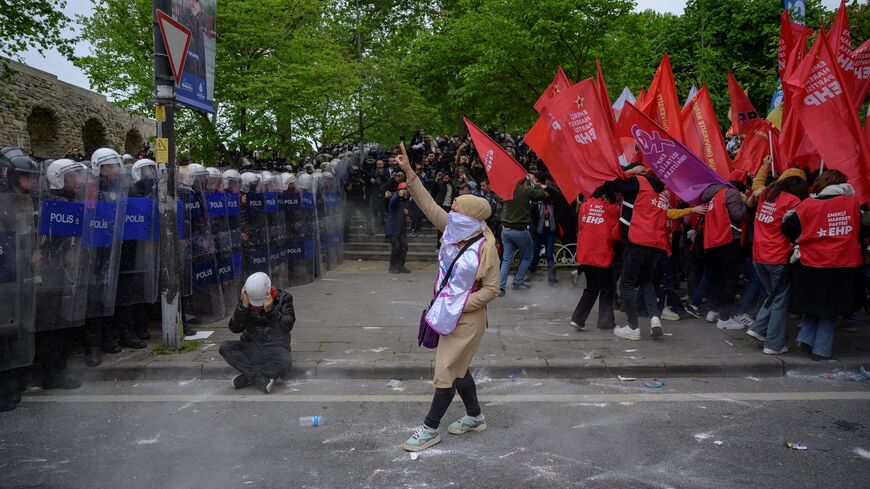ANKARA — Istanbul police detained more than 200 people on Wednesday during May Day demonstrations across the province as they prevented crowds from reaching Istanbul’s Taksim Square, a symbolic venue to mark International Workers Day.
Turkish Interior Minister Ali Yerlikaya said that 210 people were detained as they attempted to march toward Taksim Square.
Riot police used pepper spray and rubber bullets to disperse tens of thousands who had gathered in Istanbul's Sarachane district after demonstrators sought to march toward Taksim.
Dozens were injured during the confrontation, local media reported, as footage from the scene showed police manhandling demonstrators.
A police officer was heard instructing other officers to “clear out the press” from the area during a live broadcast, sparking outrage from human rights groups. Erol Onderoglu, Turkey's representative for Reporters Without Borders, said that the order reflected “the authoritarian mindset and hostile approach toward journalists.”
Nearly 42,000 police officers were deployed around Istanbul, according to Istanbul Gov. Davut Gul, and authorities shut down major arteries on the province's European side in a bid to prevent demonstrators from marching to Taksim.
An image widely circulated on social media showed a barricade of police officers and armored police vehicles under the historic Valens Aqueduct in Sarachane, which leads to Taksim. Reuters reported that snipers were also deployed at the scene.
#1Mayıs milli utancımız! pic.twitter.com/cokg64tq0g
— Erol Önderoglu (@ErolOnderoglu) May 1, 2024
In Taksim, police used metal barricades to cordon off the square — a symbolic venue for May Day demonstrations since 1977 when unidentified assailants opened fire on the crowd of hundreds of thousands, killing at least 34 and wounding many more in the ensuing stampede.
Only a few dozen people from unions close to the government were allowed inside the square to lay wreaths and carnations in memory of those lost in 1977.
The opposition, including the main opposition Republican People’s Party (CHP), and civic groups repeatedly called on the government to open up the square for demonstrations earlier this week, but to no avail.
“Taksim Square is a place of huge symbolic significance and has long been a place where people gather in protest and in celebration,” Amnesty International’s Deputy Regional Director for Europe Dinushika Dissanayake said in a statement on Tuesday. “For more than a decade, the Turkish authorities have unlawfully restricted people’s right to assembly and criminalized peaceful protests that take place in the square.”
CHP leader Ozgur Ozel, who joined the demonstrators along with Istanbul Mayor Ekrem Imamoglu in Sarachane, slammed earlier on Wednesday the government’s rejection of the calls. "Our goal is Taksim Square because it is the symbol of May 1st,” he said.
Taksim Square had been off limits for May Day demonstrations for decades until 2010, when Turkish President Recep Tayyip Erdogan established the date as a national holiday.
The square was opened to May Day demonstrations from 2010 to 2012, but it was closed again in 2013 as public dismay at Erdogan’s government grew. Violent police intervention against May Day demonstrators in 2013 later culminated in the nationwide Gezi Park protests, the largest popular uprising to date against Erdogan’s government.
In Turkey’s other metropolises, including the capital, Ankara, and the Aegean port city of Izmir, the demonstrations ended peacefully. In Turkey’s predominantly Kurdish southeast, thousands — including the region’s newly elected mayors from the pro-Kurdish DEM Party — gathered in Batman to mark the day.
Workers in Turkey, where annual inflation has surged to almost 70%, face significant challenges. Roughly 40% of the country’s population lives on the minimum wage of 17,002 liras (some $523) monthly. The figure stands below the hunger threshold, representing the monthly cost of a healthy diet for a family of four, which stood at 17,725 liras (roughly $545) in April, according to TURK-IS, the country’s largest confederation of workers unions.



